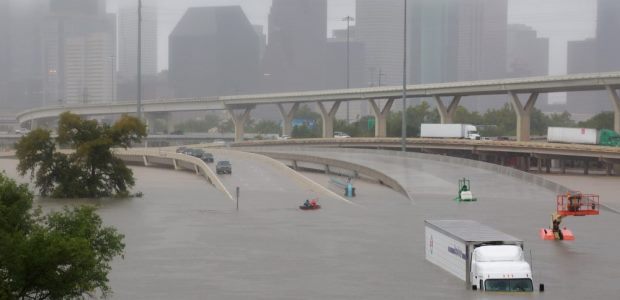
Association's Report Covers Hospitals' Problems During Harvey
The report says there were an insufficient number of emergency shelters ready to take in evacuees, and the ones that were open lacked the ability to care for people with some medical conditions, particularly those with quadriplegia and those needing dialysis or who were ventilator-dependent.
The Texas Hospital Association released a report Feb. 6 that analyzes Texas hospitals' disaster response before, during, and after Hurricane Harvey and difficulties they faced, notably in security. The eight-page report include findings and recommendations for future preparation strategies; it was discussed during a panel that day on hospital emergency preparedness at THA's Annual Conference and Expo in Houston.
"Texas hospitals leveraged innovative approaches to — among other things — transfer the most vulnerable patients, stall the rising flood water and feed and house evacuees who arrived unexpectedly," said Carrie Kroll, vice president of advocacy, quality, and public health at the association. "It is important that the lessons learned are shared with hospital colleagues throughout the state so that, as an industry, we are even better prepared when the next storm hits."
The report says there were an insufficient number of emergency shelters ready to take in evacuees, and the ones that were open lacked the ability to care for people with some medical conditions, particularly those with quadriplegia and those needing dialysis or who were ventilator-dependent.
There was inappropriate reliance on hospitals as shelters and evacuation sites, it says, and the availability of security was a major concern for hospitals affected by the hurricane. A Beaumont hospital that had been closed prior to the storm reported that armed individuals broke into its facility, seeking shelter, and only after eight hours did state police arrive to disperse them. Other hospitals reported break-ins to steal pharmaceuticals, it says.
THA said in the report that it will consider coordinating a meeting with key partners to discuss hospitals' supply needs and communications challenges during major storms such as Harvey, which is among the nation's costliest natural disasters. Only 20 Texas hospitals closed or evacuated during it, however.
"We are extremely proud of the professionals who came together during the storm to provide seamless care to the state's most vulnerable while the storm raged outside," said Ted Shaw, THA's president and CEO. "Separated from family and without knowing the fate of their own homes and property, our hospital families went above and beyond to provide medical care and shelter during this historic storm."
It also says recovering and rebuilding after Harvey will take years, and it will be essential to attend to these issues: flood mitigation, emotional and behavioral support, building inspector guidelines, and the public health impact.
During November 2017, the associate distributed more than $2.2 million to more than 5,000 hospital employees affected by the hurricane in Southeast Texas, and the final page of the report lists dozens of hospitals and hospital associations that contributed to the THA Hospital Employee Assistance Fund that made the distributions possible.